I think we can all agree that this year, so far, has been an emotional roller coaster—with global politics more fraught than ever, numerous natural disasters beating us down, and celebrities dropping like flies, it’s easy to wish for an alternate 2016 in which, say, a very-much alive David Bowie and Prince are elected global co-rulers, and their only mandate is a 200% increase in World Glitter Output. Your perfect world scenario may differ slightly, but I suspect not by much…
It seems this “what if…?” mentality has seeped into the literary zeitgeist, as 2016 has delivered a mighty crop of alternate histories—below, I’ve gathered some of this year’s most thought-provoking titles for your perusal! From Nisi Shawl’s steampunk haven in the Congo to Lavie Tidhar’s noir-inspired fascist London, these books cover a diverse array of timelines and possible paths.
Everfair, by Nisi Shawl
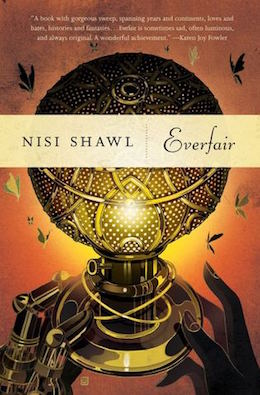 In this Neo-Victorian alternate history, Nisi Shawl asks the question: what if the native population of the Congo had acquired steam tech before the Belgian colonization? A coalition of British socialists, African-American missionaries, and people of the Congo buy land from King Leopold II, and work to transform it into a utopia called Everfair, creating a haven both for natives of the Congo and African-Americans escaping slavery.
In this Neo-Victorian alternate history, Nisi Shawl asks the question: what if the native population of the Congo had acquired steam tech before the Belgian colonization? A coalition of British socialists, African-American missionaries, and people of the Congo buy land from King Leopold II, and work to transform it into a utopia called Everfair, creating a haven both for natives of the Congo and African-Americans escaping slavery.
Shawl uses one of history’s worst human right violations as a jumping off point to explore the wonders humans can create if they work together. She tells her story through the voices of Africans, Europeans, East Asians, and African-Americans, from a variety of backgrounds and social strata, to create a new kind of diverse, historically resonant steampunk.
League of Dragons, Temeraire Series, by Naomi Novik
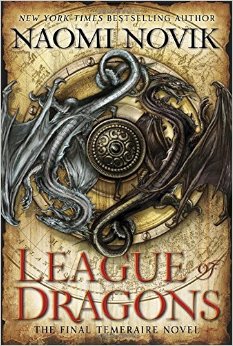 Naomi Novik’s Temeraire series takes our world and adds dragons! Specifically the books are “a reimagining of the epic events of the Napoleonic Wars with an air force—an air force of dragons, manned by crews of aviators,” and as you might expect, the dragons alter the timeline in some really interesting ways. The books follow the (human) Captain William Laurence, of the British Royal Navy, and his (dragon) best friend, Temeraire. The series sails around the globe, hopping from continent to continent to showcase how the presence of dragons has affected each culture. While the first three novels focus on the Napoleonic Wars, later books travel to North America, Australia (which is still a penal colony), South America, Japan and China.
Naomi Novik’s Temeraire series takes our world and adds dragons! Specifically the books are “a reimagining of the epic events of the Napoleonic Wars with an air force—an air force of dragons, manned by crews of aviators,” and as you might expect, the dragons alter the timeline in some really interesting ways. The books follow the (human) Captain William Laurence, of the British Royal Navy, and his (dragon) best friend, Temeraire. The series sails around the globe, hopping from continent to continent to showcase how the presence of dragons has affected each culture. While the first three novels focus on the Napoleonic Wars, later books travel to North America, Australia (which is still a penal colony), South America, Japan and China.
Like Shawl, Novik tackles the idea of colonialism, which often fails utterly now since dragons can side with native populations against invaders; Hernando Cortez is killed by a dragon, meaning he can’t conquer Mexico; The Han Dynasty is founded by a dragon rather than a human; Tecumseh becomes President of the United States in the early 1800s; the Incan Empire is strong enough in the mid-1800s to negotiate with Britain. The ninth book in the series, League of Dragons, was released in June, and tells a more personal story of Temeraire’s hunt for his stolen egg.
Underground Railroad, by Colson Whitehead
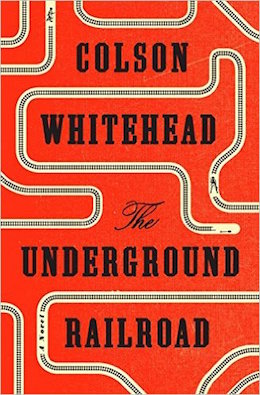 The heart of The Underground Railroad is Cora, a woman born into slavery who allies with another enslaved man to escape to the North. But Whitehead has made the engine of the story literal: The Underground Railroad is a real railroad, maintained by real train conductors, who work under constant threat as they trundle people into their cars and up the next set of tracks. As a review in The Millions said:
The heart of The Underground Railroad is Cora, a woman born into slavery who allies with another enslaved man to escape to the North. But Whitehead has made the engine of the story literal: The Underground Railroad is a real railroad, maintained by real train conductors, who work under constant threat as they trundle people into their cars and up the next set of tracks. As a review in The Millions said:
Some of the stations are elaborate constructions, with comfortable waiting areas and refreshments, and some are rundown holes with boxcars. The tunnels and conductors are under a repeat threat of discovery. For something fantastic (imagine the engineering feat), not a bit of it is lacking in verisimilitude.
By making the railroad real Whitehead creates a tiny piece of alternate history that makes the real facts all the more jarring and horrifying; he based his accounts of slavery on the memoirs of people including Harriet Jones and Frederick Douglass, as well as accounts collected by the Works Progress Administration. He also uses some Western tropes in the character of Ridgeway, the bounty hunter who dogs Cora’s every haunted step.
Underground Airlines, by Ben H. Winters
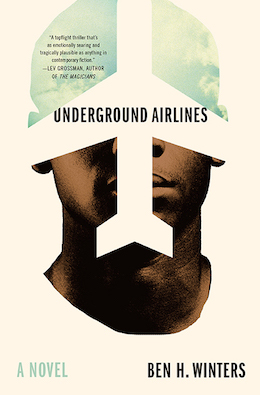 Ben Winter posits a United States where the Civil War never happened, and four Southern states still practice slavery. The story’s narrator is Victor, a bounty hunter who specializes in tracking down “peebs”, i.e. PBL i.e. Persons Bound to Labor—the prettied up term the U.S. government uses for enslaved people. As the title suggests, there is still a network of people working to smuggle people out of the “Hard Four” states. We know we’re in the near-future because Victor has a tracking implant, and we know that we still have some tokens from our own timeline, because people say snarky things about To Kill a Mockingbird and James Brown and Martin Luther King Jr. have still impacted culture, just in somewhat different ways.
Ben Winter posits a United States where the Civil War never happened, and four Southern states still practice slavery. The story’s narrator is Victor, a bounty hunter who specializes in tracking down “peebs”, i.e. PBL i.e. Persons Bound to Labor—the prettied up term the U.S. government uses for enslaved people. As the title suggests, there is still a network of people working to smuggle people out of the “Hard Four” states. We know we’re in the near-future because Victor has a tracking implant, and we know that we still have some tokens from our own timeline, because people say snarky things about To Kill a Mockingbird and James Brown and Martin Luther King Jr. have still impacted culture, just in somewhat different ways.
Where Whitehead grafted some Western tropes onto Underground Railroad, Winters uses noir tropes to tease out the idea of Victor as a detective tracking down clues, but here the clues lead to humans trying to avoid horrifying abuse and dehumanization, not just, say, a Maltese Falcon.
Judenstaat, by Simone Zelitch
 Simone Zelitch’s Judenstaat begins by reshaping Europe. On April 4th, 1948 the sovereign state of Judenstaat was created in the territory of Saxony, bordering Germany, Poland, and Czechoslovakia. This Jewish state, supported by Jews, Allies, and “Righteous Gentile” Germans, is about to celebrate its 40th Anniversary. Librarian Judit Klemmer is hired to head up a documentary project celebrating Judenstaat’s history, but she is finds the work nearly impossible as archivists and historians refuse to give her straight answers about the country’s founding. Worse, she is haunted by the murder of her husband, even as the nation itself is haunted by anti-Semites, a group called the Cosmopolitans, “Black-Hat” fundamentalist Jews, and the fascists who continue to pop up across Europe and Russia.
Simone Zelitch’s Judenstaat begins by reshaping Europe. On April 4th, 1948 the sovereign state of Judenstaat was created in the territory of Saxony, bordering Germany, Poland, and Czechoslovakia. This Jewish state, supported by Jews, Allies, and “Righteous Gentile” Germans, is about to celebrate its 40th Anniversary. Librarian Judit Klemmer is hired to head up a documentary project celebrating Judenstaat’s history, but she is finds the work nearly impossible as archivists and historians refuse to give her straight answers about the country’s founding. Worse, she is haunted by the murder of her husband, even as the nation itself is haunted by anti-Semites, a group called the Cosmopolitans, “Black-Hat” fundamentalist Jews, and the fascists who continue to pop up across Europe and Russia.
Then a real, seemingly solid ghost turns up in her life, and leaves her a simple, terrifying note: “They lied about the murder.” But…which murder? IS her husband still alive? Or is she on track to uncover other crimes? Where Michael Chabon gave us an Alaskan Jewish State in Yiddish Policeman’s Union, Zelitch places her right in the heart of Europe, where all the tensions and blood-soaked history can come to the surface as Judenstaat struggles to remain a nation for its people.
A Man Lies Dreaming, by Lavie Tidhar
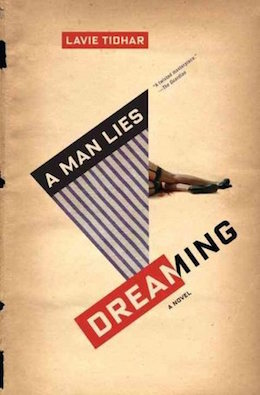 Also somewhat reminiscent of Chabon’s novel, Lavie Tidhar’s A Man Lies Dreaming uses noir tropes to deal with the legacy of the Holocaust. Here we follow Wolf, a PI who ends up in London in 1939. He’s viciously anti-Semitic, and laments The Fall—the moment in 1933 when the National Socialists lost their brief control over Germany, and ceded defeat to the Communists. But…cash is cash, so he puts his hatred of Judaism on the backburner long enough to accept a job from Isabella Rubinstein. In classic noir tradition, Rubinstein’s sister seems to be in trouble—the girl was smuggled out of Germany, but disappeared before she got to Isabella.
Also somewhat reminiscent of Chabon’s novel, Lavie Tidhar’s A Man Lies Dreaming uses noir tropes to deal with the legacy of the Holocaust. Here we follow Wolf, a PI who ends up in London in 1939. He’s viciously anti-Semitic, and laments The Fall—the moment in 1933 when the National Socialists lost their brief control over Germany, and ceded defeat to the Communists. But…cash is cash, so he puts his hatred of Judaism on the backburner long enough to accept a job from Isabella Rubinstein. In classic noir tradition, Rubinstein’s sister seems to be in trouble—the girl was smuggled out of Germany, but disappeared before she got to Isabella.
Wolf stalks through 1930s London searching for the girl, while a Hitler-obsessed serial killer begins a murder spree, former Nazis like Hermann Göring and Leni Riefenstahl find new jobs, and a British Fascist named Oswald Mosley begins to pick up more and more supporters in his race for Prime Minister. As the novel continues, Tidhar gives us more clues to wolf’s real identity, and punctures his alternate history story with nods to reality as a pulp writer named Shomer dreams up a detective novel while suffering the horrors of Auschwitz.
Ōoku: The Inner Chambers, by Fumi Yoshinaga
 Ōoku: The Inner Chambers is an ongoing manga that alters the timeline in feudal Japan. A plague hits that destroys the male population—including the Shogun, who leaves only an illegitimate daughter as an heir. The story picks up 80 years after the initial outbreak. Japan is entirely matriarchal, and lives under a 1:4 ratio of men to women. Because of this, women take up all the government positions, as well as the vast majority of farming and trade. Men are treated like hothouse flowers, with a full, rigidly stratified harem kept for the Shogun, while lower-class men find themselves courted by wealthy women who want a chance at motherhood.
Ōoku: The Inner Chambers is an ongoing manga that alters the timeline in feudal Japan. A plague hits that destroys the male population—including the Shogun, who leaves only an illegitimate daughter as an heir. The story picks up 80 years after the initial outbreak. Japan is entirely matriarchal, and lives under a 1:4 ratio of men to women. Because of this, women take up all the government positions, as well as the vast majority of farming and trade. Men are treated like hothouse flowers, with a full, rigidly stratified harem kept for the Shogun, while lower-class men find themselves courted by wealthy women who want a chance at motherhood.
Fumi Yoshinaga began the series in 2005, and it has since been awarded an Excellence Prize from the 2006 Japan Media Arts Festival, a special prize from The Japanese Association of Feminist Science Fiction and Fantasy’s, and the Tezuka Osamu Cultural Prize in April 2009. Volume 12 in the series will be available in the U.S. on November 15, 2016.
Fallout: The Hot War, by Harry Turtledove
 Esteemed alternate historian Harry Turtledove began his latest series, The Hot War, with Bombs Away. 2016 sees the sequel, Fallout, continuing the story. Alternative history always begins with a question, and Turtledove asks a terrifying one in this series: What if President Harry Truman had ordered nuclear weapons to be used in the Korean War? TL;DR: many, many explosions. After the U.S. strikes Manchuria, the U.S.S.R. retaliates by attacking Europe. Turtledove follows pilots, housewives, Ukrainian farmers, and British pub-owners as bombs fall and the world as they know it ends forever.
Esteemed alternate historian Harry Turtledove began his latest series, The Hot War, with Bombs Away. 2016 sees the sequel, Fallout, continuing the story. Alternative history always begins with a question, and Turtledove asks a terrifying one in this series: What if President Harry Truman had ordered nuclear weapons to be used in the Korean War? TL;DR: many, many explosions. After the U.S. strikes Manchuria, the U.S.S.R. retaliates by attacking Europe. Turtledove follows pilots, housewives, Ukrainian farmers, and British pub-owners as bombs fall and the world as they know it ends forever.
Fallout, as its title suggests, deals with the aftermath, as Truman plots vengeance against Stalin, and Stalin unleashes a new wave of horror on Europe. Is there any way back from Global Nuclear War? Turtledove will let us know in the third book in the series, Armistice [ed. note: Armistice is a title change from All the King’s Horses] due out in 2017. But with that title, the future does not look bright for #TeamHumanity.
Have I missed any of your favorite alternate histories from this year? How do you think these titles will stack up against classics like The Man in the High Castle, Ada or Ardor, and The Coming of the Quantum Cats? Let us know in the comments!
Leah Schnelbach always wanted to live in the alternate timeline where geek culture was mainstream… and now she does. Spooky. Come talk to her on Twitter!









